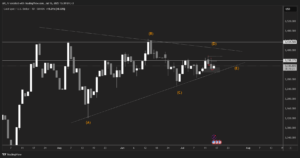European stock indices are set to rise today following a late rebound on Wall Street, although the mood remains cautious.
· Credit Suisse warns on profit & WIZZ Air forecasts an operating loss
· Eurozone GDP is expected to confirm 0.3% QoQ growth
· Yen slides as central bank divergence become increasingly apparent
After a softer start yesterday, Wall Street performed a U-turn, boosted by a surge in energy stocks and a rebound in the tech sector, which overshadowed weakness in consumer staples after another profit warning from Target.
With little in the way of US economic data and with Federal Reserve speakers absent ahead of next week’s FOMC meeting, the market remains focused on inflation and central bank action. Investors continue to flip-flop from fears that aggressive central bank action to tame inflation could stifle growth to optimism that a soft landing is still likely.
There has, in fact, been a slight rebound in equity markets over recent weeks. However, the market is waiting for peak inflation to pass before making any meaningful moves higher. With this in mind, all eyes are on Friday’s CPI inflation data.
Europe
Ahead of the open in Europe, DAX futures trade +0.4%, and the FTSE futures are up 0.3%. The mood remains cautious following a profit warning from Credit Suisse. A combination of the Russian war and higher costs mean the lender is now expected to report a loss in Q2.
Sticking with stock, WIZZ air will be under the spotlight not just due to the travel chaos seen in the airports in recent weeks but also after the budget airline forecast an operating loss in Q1 and a larger annual loss. WIZZ Air said that demand remained strong, but operational challenges were proving to be expensive. The stock trades 40% lower so far this year.
Economic calendar
Today the economic calendar is relatively light. German industrial production rose in April by a less than expected 0.7% MoM, recovering from a -3.7% decline in March. The data comes after German factory orders unexpectedly fell -2.7% MoM yesterday as strict lockdown restrictions in China further disrupted supply chains, which were already pressurised by the Russia-Ukraine war.
Looking ahead, eurozone GDP data is expected to confirm the preliminary reading of 0.3% growth QoQ. The data will be closely watched ahead of tomorrow’s ECB rate announcement and amid concerns that tighter monetary policy could increase the risk of stagflation.
JPY
In the FX markets, the yen lost ground yesterday and continues to slide today. With the outsized rate hike by the RBA and other major central banks hiking rates rapidly, central bank divergence is growing increasingly apparent. Japan reported weaker household spending, a contraction in Q1 GDP, and few signs of wage pressure, meaning the BoJ has few reasons to tighten monetary policy. This is, of course, in sharp contrast to the Fed, which is expected to act aggressively to tame 40-year high inflation.
USD/JPY has risen over 133.00 and trades at a 2-decade high. Given the strong fundamentals, the pair could look to target 135.00, a level last seen in February 2002.
Disclaimer: This article is not investment advice or an investment recommendation and should not be considered as such. The information above is not an invitation to trade and it does not guarantee or predict future performance. The investor is solely responsible for the risk of their decisions. The analysis and commentary presented do not include any consideration of your personal investment objectives, financial circumstances, or needs.





